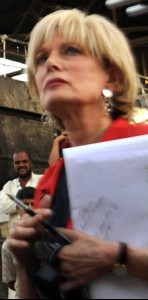Now comes the venerable television news show 60 Minutes, leading the way to a consideration of the pros and cons of hydraulic fracturing for so-called “natural” gas. They led the way if, that is, you don’t count the hard-hitting documentary Gasland that aired months ago on HBO, or the solid investigative reporting done by Pro Publica over recent years.
Considered in its entirety, the piece did a decent job of explaining what hydraulic fracturing is (the injection of water and a brew of toxic chemicals deep underground at pressures high enough to blow apart shale and release the gas trapped in it) and what its dangers are. But the first half of the piece was a nearly-unqualified rave about the wonders of “natural” gas and the abundance of it in America.
Yes, correspondent Lesley Stahl did get around to the horrors inflicted on people and animals by hydraulic fracturing, the poisoned and exploding wells, the surface spills of toxic chemicals, the sudden invasion of industrial operations into spaces next to rural retreats and childrens’ playgrounds. These downsides were well documented, shown to us, so how can anyone complain about the fairness and balance of a piece that included such vivid coverage of the negatives?
Here’s the problem. The other side of the coin — the advantages and benefits of “natural” gas (obtained in this most unnatural way) were covered first, were given more than equal status with the negatives, without confirming evidence. Ms. Stahl allowed these benefits to be claimed by the president of a hydraulic-fracturing company, Aubrey McClendon, with little or no follow up either to confirm half-truths or to challenge lies.
According to McClendon, “In the last few years, we’ve discovered the equivalent of two Saudi Arabias of oil in the form of natural gas in the United States. Not one, but two.” Ms. Stahl said, in effect, “Really?” and carried on. But in fact no such thing has happened. A technique has been developed that under certain circumstances can release gas from nearly solid rock. We always knew the gas was there, we’ve drilled thousands of wells to get at the easy pockets. And the “two Saudi Arabias” line? A wild guess about what you might get if you drilled everywhere with total success, including, for example, downtown Pittsburgh.

CBS correspondent Lesly Stahl, a victim of the Don Rumsfeld Self-Interview Technique. (US Air Force photo)
“But natural gas is still a fossil fuel,” Stahl pointed out to McClendon, by which she meant, probably, that it was created eons ago, exists in a finite amount and will one day be exhausted. Oil and gas people learned long ago how not to face the logic here, that we are burning down the house to keep warm. McClendon used the recently invented Rumsfeld Self Interview Technique, invented and perfected by Don Rumsfeld when as Defense Secretary he was being grilled about the war in Iraq. The method consists of listening to the question asked and, after deciding it is unanswerable, asking yourself a different question and answering that one.
“So is it perfect?” McClendon asked himself. “No,” he answered. You expect amateur reporters to get rolled by this technique, but Lesley Stahl?
True, she did — eventually, and gently at first — start to get around to the bad stuff. “What would happen if you go down to dig for shale and you have an explosion and you destroy a whole part of the country?” she asked.
“It cannot happen, okay?” McClendon replied.
Not okay. Here he used another classic technique, narrowing the question down to its smallest dimension. (This works best when the question is as awkwardly phrased as this one was.) It is true that you can’t have an explosion deep underground where there is no oxygen, but explosions and fires at the wellhead and in the area where fracturing is being done are frequent. Yet Stahl did not call him on it, merely observing later in the report that the industry has racked up thousands of accidents and safety violations above ground.
Finally, at last, Stahl began to bear down. “Part of the fracturing process involves you pouring down some pretty nasty chemicals. What happens if they spill all over the place?” McClendon immediately went into Rumsfeld Self-Interview mode: “Okay, let’s define nasty chemicals,” he replied. “Nasty chemicals are underneath your sink. The reality is, you don’t drink Drano for a reason, but you have Drano in your house. If you want to define them as nasty, go ahead. You don’t want to drink frack fluid.”
You will note that the question she asked — what happens if they spill — went unanswered while he warned us, gratuitously, not to drink Drano. Instead of calling him on it, she asked a different question. “But isn’t there a possibility, a possibility that you go down and something seeps and it gets into the water supply, gets into the aquifer?”
“Ah, that’s the fear isn’t it?” McClendon replied, a la Rumsfeld.
“But fresh water aquifers are only from the surface to about one thousand feet below the surface of the earth, okay? We are fracking wells at depths of 7, 8, 10, 12 thousand feet. Okay? So there is almost two miles of rock between where we are active and where fresh water is drawn from,” McClendon said.
But it is not okay. That one mile of rock (the difference between the thousand-foot depth of the aquifers and the 7,000-foot depth he mentioned first) is pierced first by the fracturing well itself, then by who knows how many old wells, then by unexpected fissures and cracks. The fracturing can and does inject toxic chemicals into the aquifers and move them, as well as the gas released, for miles in totally unexpected directions.
Stahl did not mention that the unbridled enthusiasm for fracturing is bringing wells farther and farther into the densely populated northeast, where they are beginning to threaten the aquifers supplying water to such cities as New York City.
In short, the gas promoter got to make all the unrealistic, undocumented and untrue statements he wanted to make while the people ruined by the promoter were required to show us, for example, that their tap water explodes. Fair? Balanced? You decide.
